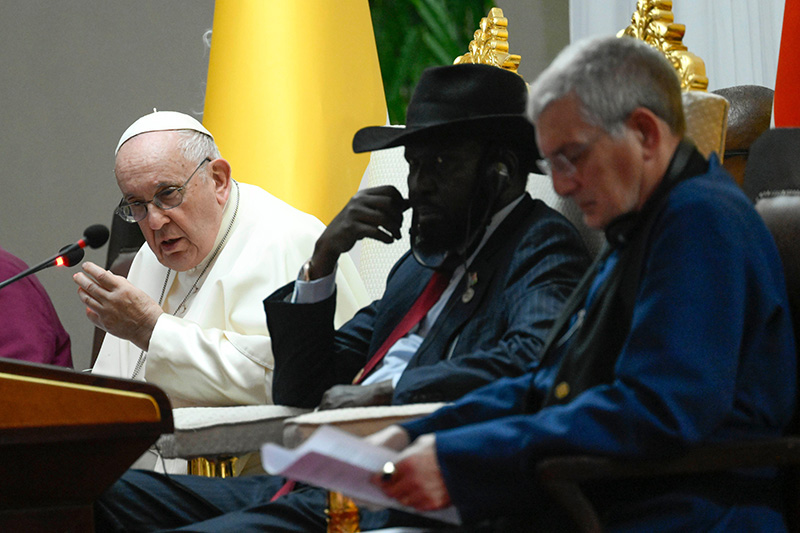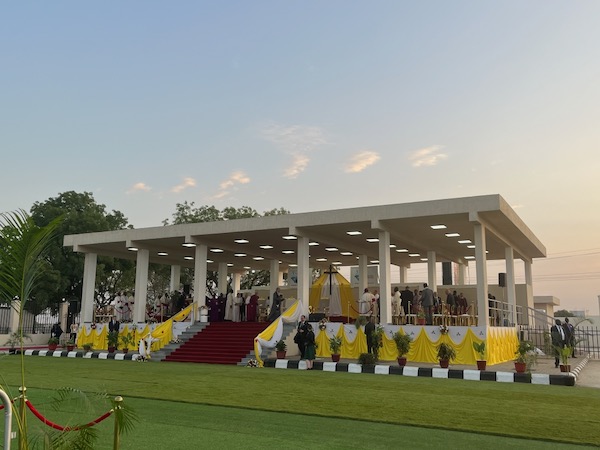Under the blazing sun in sub-Saharan Africa, the leaders of the three main Christian denominations sought to bring the cool breeze of unity to South Sudan by bolstering the churches' mission of working together for peace and on the margins of society.
A powerful ecumenical witness was on display in the capital city of Juba on 4 February as Pope Francis, the Archbishop of Canterbury Justin Welby and the Moderator of the General Assembly of the Church of Scotland Iain Greenshields came together to meet thousands of people displaced by South Sudan’s long-running civil war.
Afterwards, they shared a stage for an ecumenical prayer at the mausoleum dedicated to John Garang, the founding father of the youngest country in the world.
The unprecedented peace pilgrimage reflects the proactive ecumenical approach modelled by Francis throughout his pontificate, centring what Christians can do together, rather than historic doctrinal differences.
“Prior to any historical divisions there remains one unchanging fact, namely, that we are Christians — we belong to Christ,” Francis told the prayer gathering, which President Salva Kiir and Vice President Riek Machar attended.
“The ecclesial divisions of past centuries should not have any impact on those who are being evangelised, and the spread of the Gospel ought to contribute to the growth of greater unity. May the tribalism and the partisan spirit that fuel acts of violence in this country not impair relationships between the various confessions.”
With South Sudan broken by war and forgotten by the international community, the church leaders have deployed their spiritual authority to raise attention to the plight of its people and push for peace. Given the influence of the churches in the country, and the urgency of the humanitarian situation, working together has become essential.
“We journey towards unity when love is concrete, when we join in coming to the aid of the outcast, the wounded and the disenfranchised,” the Pope said, and he praised the close co-operation between the churches in South Sudan as a “precious treasure” and is an “example to all for the advancement of Christian unity.”
Along with hundreds of thousands of deaths caused by the war, an estimated 4 million South Sudanese have been forced to flee their homes: half are living in displacement camps inside the country while the other half seek refuge outside. South Sudan has a population of around 11 million people.
Around 2,500 people living in displacement camps gathered in Juba’s Freedom Hall on 4 February for a meeting with the Pope, the archbishop and the moderator. A choir from the Upper Nile camp in the northeast of the country sang beforehand, and as the Pope arrived in a wheelchair, people stood up and waved South Sudan and Holy See flags.
Luka Feter, 28, told The Tablet that he had been living in a settlement for ten years, fleeing his home due to the country’s civil war. He described the living conditions as “awful” and would like to one day continue his studies. The church leaders heard some moving testimonies from children living in the camps.
“We know you are a great leader because despite your bad knee you have come to be with us, bringing hope and a message of peace,” Rebecca Nyakour, who lives in a camp in Juba, said. “Pope Francis, we love you. Thank you for loving South Sudan.”
She went on to ask him “to give a special blessing for all the children of South Sudan so we can grow together in peace and love.”
In response, the Pope said that, with “my brothers on this pilgrimage of peace”, he was suffering with them and for them.
“The future cannot lie in refugee camps,” he stressed. “That is what I want to tell you: that you are the seed of a new South Sudan, a seed for the fertile and lush growth of this country. You, from all your different ethnic groups, you who have suffered and are still suffering, you who do not want to respond to evil with more evil.”
At the end of the meeting, the Pope put on a stole and joined with his fellow church leaders, to bless the gathering. “May the Lord bless you and keep you. May the Lord make his face to shine upon you. May the Lord…give you peace.” Later, at the conclusion of the ecumenical meeting, they once again blessed the crowd of around 50,000 people.
Archbishop Welby, giving an address during the ecumenical meeting, told the young people of South Sudan, where the average age is 18, that they are both the country's present and future.
He also highlighted the suffering of women in the country, saying that “many of you live with the trauma of sexual violence,” pointing out that his wife, Caroline, who had travelled with him to South Sudan, had worked with survivors and heard their stories of bravery and strength. His remarks on women drew loud applause from the crowd.
“We have travelled on this Pilgrimage of Peace in a way that has not been done before ever,” the archbishop said. “Being a Christian draws us all into the fellowship of believers. It doesn’t matter that we are from different countries, different denominations, different tribes.”
The gathering saw different church leaders read powerful prayers for peace and reconciliation. “We confess that we are killing each other day and night; heal us from this trauma!” a leader of the South Sudan Presbyterian Evangelical church prayed. “Our people are consumed by hatred and tribalism; heal us from the trauma these cause.”
Francis said it was a “beautiful thing” that the churches in South Sudan had remained united, and that the Gospel “must not be just a beautiful religious philosophy” but something that takes root in people’s lives.
“The peace of the Holy Spirit harmonises differences, whereas the spirit hostile to God and humanity uses diversity as a means of division,” he said.
With temperatures soaring to over 90 degrees, the 86-year-old Pope began the day by travelling to St Theresa’s Cathedral in Juba, where thousands took refuge during the country’s civil war.
On the morning of 4 February, Francis arrived to the sound of cheers and ululations from a 5,000-strong crowd who had gathered outside while inside the cathedral he spoke to 1,000 church leaders, including bishops, priests, deacons, religious and seminarians.
Among them were Sr Orla Treacy, an Irish Loreto sister, and a group of young people who had walked the 150 kilometres (93 miles) of the 410 kilometres (254 miles) from Rumbek, in the centre of the country, to Juba to see Francis.
In his speech, the Pope referenced that some people had walked for days ahead of their meeting and afterwards posed for a photo with the group.
Among those who took part in the walk was Aniong Deng, a student at the all-girls Loreto school run by Sr Orla. Speaking outside the cathedral, she hoped the Pope’s ecumenical pilgrimage would lead to a “new South Sudan”.
Inside, Bishop Yunan Tombe Trily, the President of the Bishops’ Conference of Sudan and South Sudan, said that in Francis’ “concern for immigrants, we see an example of the Lord’s message of mercy.
You have urged us to welcome the stranger with empathy and to truly open our hearts to all, from the refugee fleeing war-torn lands, to the immigrant leaving his home in search of a better life.”
Francis also heard about Sister Mary Daniel Abut and Sister Regina Roba Luate, killed on 16 August 2021, 30 miles outside Juba, as they returned from a parish celebration. Sr Mary had worked as a religious superior and headteacher while Sr Regina was a nurse and public health official.
In his speech, Francis said they had “offered their lives for the sake of the Gospel,” and said “we need courageous and generous souls ready to suffer and die for Africa.”
Quoting the late biblical scholar, Cardinal Carlo Maria Martini, the Pope pointed out that it means “to step into the middle’, to be willing to walk into the middle of a situation.” Francis said, “Sometimes we do not obtain much, but we need to offer a cry of intercession.”
While the Pope was in St Theresa’s, Archbishop Welby was in All Saints Cathedral, Juba, where he urged all those who had committed “secret crimes and evil deeds” to seek God’s mercy.
“If South Sudan finds peace, the world will find hope,” he told the congregation during his sermon. “The women in Congo will rejoice if you find peace. The refugees in Myanmar will rejoice if you find peace. The soldiers in Ukraine will rejoice if you find peace.”
The Pope’s historic peace pilgrimage began on 3 February with a meeting with the country’s political leaders, and is seen as the most significant event to take place in the history of the country.
In another sign of the impact of the pilgrimage, President Kiir, a Catholic, announced he had pardoned 71 prisoners, including 36 inmates on death row. The South Sudan Broadcasting Corporation announced the decree.
Although no reason was given for the decision, it came the day after President Kiir had met with the Pope, the Archbishop and the Moderator. Francis has amended Catholic teaching to make the death penalty “inadmissible” and, at Christmas, he wrote to heads of state urging them to make a gesture of clemency to prisoners.
On Sunday, 5 February, the Pope concluded his ecumenical pilgrimage by presiding at a Mass for around 100,000 people at the John Garang Mausoleum. In this place, South Sudan declared its independence in 2011.
Francis processed through the cheering crowds in his popemobile while the liturgy reflected elements of South Sudanese culture. The Orbap group, wearing sashes with an image of Pope Francis and the Holy See crest, worshipped in a traditional way during the entrance procession and penitential rite. Archbishop Welby and Dr Greenshields attended the Mass and were seated near the altar while President Kiir, a Catholic, and the country’s political leaders were also present.
In his homily, the Pope denounced the “corruption of evil, the disease of division, the filth of fraudulent business dealings and the plague of injustice.” He told the people gathered that “they are the salt of the earth in the country”, urging them not to be discouraged even if their contribution is small, as it can have a decisive influence.
“Let us overcome the dislikes and aversions that over time have become chronic and risk pitting tribes and ethnic groups against one another,” the Pope said “Let us learn to apply the salt of forgiveness to our wounds; salt burns but it also heals.”
After the Mass, the Pope was driven to the airport in Juba to board the flight back to Rome. The archbishop and the moderator joined him on the papal plane.
Christopher Lamb, The Tablet’s Rome Correspondent, is among the journalists travelling with Pope Francis and is filing regular reports on the papal visit to Africa.



 Loading ...
Loading ...